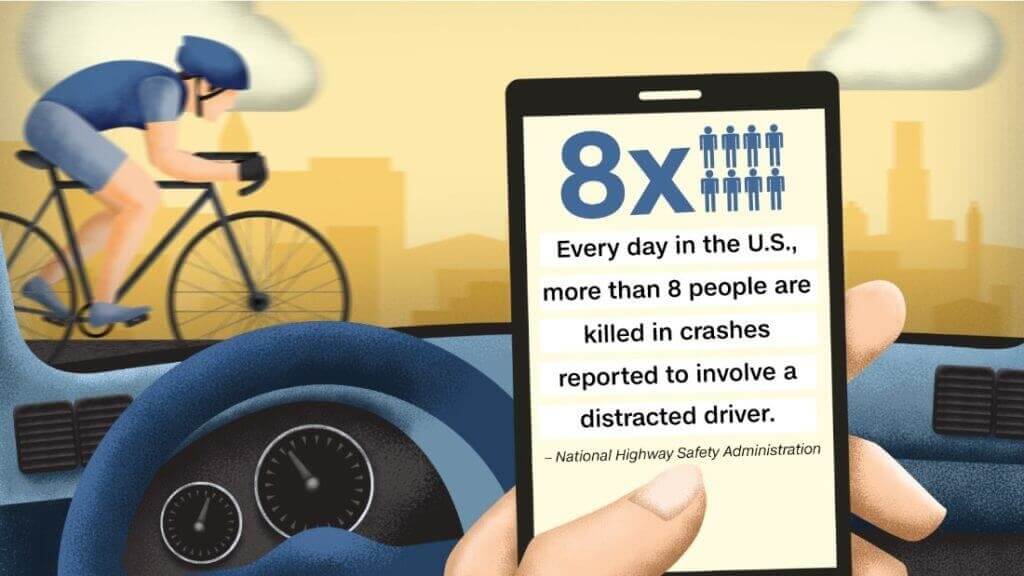Have you ever done something while driving and thought to yourself, “Is this legal?” You’re not alone. We’ve created a list of distracted driving myths that may surprise you. Keep reading to find out the truth about some of the biggest misconceptions surrounding distracted driving in Florida.
Myth #1: It’s legal to drive with headphones
False! Under Florida law (Florida Statute 316.304), it’s illegal to drive a vehicle while wearing a headset, earphones, headphones or other listening devices, with the exception or hearing aids or instruments for the improvement of defective human hearing. Drivers who break this law can be punished with a fine over $150.00.
This law was created to help protect motorists and pedestrians. If a driver is wearing headphones, it is difficult for him or her to hear vital sounds or signals, such as emergency vehicle sirens and horns from other cars. Wearing headphones while driving is a form of distracted driving and can be very dangerous.
Myth #2: It’s legal to drive with a dog in your lap
True! In Florida, there is no law against driving with an unrestrained pet in your vehicle. However, driving with an unrestrained pet can not only be distracting, pets can turn into potentially hazardous projectiles if you are involved in an accident.
AAA study shows people engage in bad behavior with pets in the car
AAA conducted a research survey about people’s habits when they have an animal in the car.1 Here’s a few of the key findings:
- 56% of respondents said they drive with their dog at least once within the previous 12 months
- 52% admitted to distracting behavior, like reaching around to pet their dog while driving
- 23% said they have used their arm or hand to try and restrain their pet when braking hard
- 19% have used their arm, taking their hand off the steering wheel, to keep their dog from climbing up front
- 17% admitted to holding their dog on their lap while driving
Myth #3: It’s legal to use your cell phone while stopped at a red light
True! While it is illegal to text while driving in Florida, the law does not apply to vehicles that are stopped. The law specifically states, “a motor vehicle that is stationary is not being operated and is not subject to the prohibition in this paragraph.” So, yes, Florida drivers can still text while stopped at a red light, or at any point when their vehicle is stationary. As soon as you step on the gas, though, texting becomes illegal.
It should also be noted that texting while stopped can still be distracting. In another AAA study, researchers found that people are distracted up to 27 seconds after they finish sending a text.2 This is because texting takes your focus away from your surroundings. Have you ever been honked at for not noticing the light turning green and then stepped on the gas without really checking to see if the coast was clear? This is a perfect example of how texting can distract you even while stationary.
Myth #4: It’s illegal to eat while driving
False! There is no law in Florida that will allow an officer to pull over a driver for specifically eating and issue a ticket. However, eating while driving can be incredibly distracting. According to the National Highway Traffic Safety Administration, eating while driving increases the likelihood of a collision by 80%. And a mindboggling 65% of near-miss crashes are caused by distracted drivers who are eating or drinking.3
Myth #5: It’s safer to use hands-free devices while driving than hand-held devices
False! How often have you heard someone say that calling or texting using a hands-free device is perfectly safe when behind the well? Well, the National Safety Council (NSC) has news for those drivers: using a cell phone while driving, even when both hands are firmly planted on the wheel, is dangerous behavior—and to believe otherwise is to buy into one of the biggest distracted driving myths out there.
The reality is that drivers using handheld or hands-free cell phones are four times more likely to be involved in a car crash. The NSC estimates that drivers using cell phones are involved in 21 percent of all crashes in the United States.4
Distracted driving accidents on the Treasure Coast
A significant injury can take a devastating toll on your life and the lives of your loved ones. If you’re feeling overwhelmed by physical, emotional or financial stress after an accident, turn to an experienced personal injury attorney based locally on the Treasure Coast.
For over 40 years, Board Certified Civil Trial Attorney Steve Hoskins has been fighting for the rights of accident victims and their families. The Law Firm of Hoskins, Turco, Lloyd & Lloyd will:
- Stand up to powerful insurance companies to ensure you receive the financial compensation you deserve
- Handle all aspects of your case so you can focus on what matters most—getting better
- Treat you and your loved ones with dignity and respect
When you need a Treasure Coast personal injury attorney, you can trust the team at Hoskins, Turco, Lloyd & Lloyd to do everything in their power to give you the best possible outcome. We offer free case value estimate and free consultations. We have four convenient office locations in Port St. Lucie, Vero Beach, Fort Pierce, and Okeechobee. But if you can’t come to us, we will come to you.
Get a FREE case review. Contact us online or call us at 866-460-1990.
